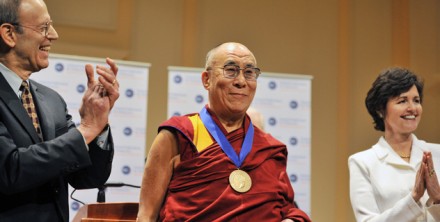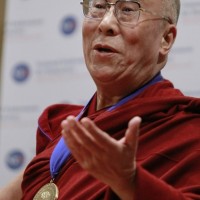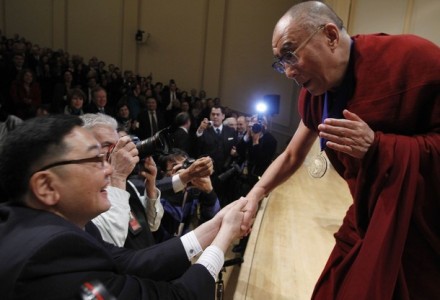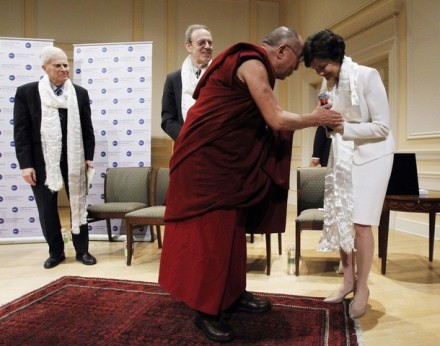
The National Endowment for Democracy presented His Holiness the Dalai Lama with the Democracy Service Medal in recognition of the Tibetan temporal and spiritual leader’s commitment to advancing the principles of democracy and human dignity. His Holiness the Dalai Lama in his remarks talked about the history of the struggles of the Tibetan people in the past 50 years.
(Click here to watch the award ceremony)
Washington, DC: His Holiness the Dalai Lama visited the Library of Congress this morning for his final programme in Washington, DC during this visit. His Holiness was received at the Library by Librarian Dr. James Billington, Carl Gershman, the president of National Endowment for Democracy (NED), and NED Board Vice Chair Judy Shelton. His Holiness then viewed some exhibits of the Library’s vast Tibetan collection, which included a Thangka depicting the Gaden Lhagyalma, presented by the 13th Dalai Lama to the American diplomat and scholar William Rockhill, who were both in Wutaishan in China, on 21 June 1908.
His Holiness then proceeded to the auditorium after attending a small reception.
Librarian Billington made an initial introductory remark in which he talked about the Library and its Tibetan collection. He said His Holiness had visited the Library of Congress twice before. He mentioned that the Library represents the democratic belief that truly representative government has to be based on knowledge and the freedom to use it.
His Holiness then talked about the Library’s Tibetan collection, which included Rockhill’s collection of books between 1888 and 1892. Billington said that the presentation of the artefacts by the 13th Dalai Lama to Rockhill has been described by historians as probably the first direct cultural contact between Tibet and the United States. Saying he is specially honoured to welcome His Holiness today, Billington said, “Your presence highlights and pays tribute to preserving the cultural and historic legacy of the Tibetan experience.”
His Holiness then introduced Judy Shelton, NED Vice Chair. She welcomed everyone to the event and gave an overview of the NED’s work. NED has supported the democratic aspirations of the Tibetan people for over 20 years. She said the projects included building democratic awareness and institutions among Tibetans in exile and to increase meaningful interaction between Tibetans and Chinese. Before inviting NED President Carl Gershman to make his remarks, Judy recognized several distinguished individuals who were present on the occasion, including former State Department officials William Taft, Paula Dobriansky, and ICT Chairman Richard Gere.
His Holiness speaks to the audience after receiving the National Endowment for Democracy’s Democracy Service Medal during a ceremony at the Library of Congress in Washington.
NED President Carl Gershman addressed the gathering on the reasons why his organization chose His Holiness the Dalai Lama for the Democracy Service Medal. He said, “We are gathered here today to honour the contribution of the Dalai Lama to the principles, values, and cause of democracy. This contribution is neither well understood nor widely recognised. The leadership of His Holiness in the struggle of the Tibetan people to preserve their culture is world renowned, and he has been honoured as a religious leader and as a man of peace. But his contribution to democracy has not received the attention it deserves. Our purpose today is to shed light on this dimension of his beliefs and purposes, one that makes the Dalai Lama especially relevant to the future of the world in which we live.”

The NED President concluded, “For his contribution to advancing the institutions, values and purposes of democracy, for giving us all a model of how to practice democracy as a way of life, and for defending the survival of the people and culture of Tibet in a way that has also contributed to world peace and human understanding, the National Endowment for Democracy is proud to present its Democracy Service Medal to His Holiness the Dalai Lama.”
Thereafter, Carl Gershman and Judy Shelton jointly presented the medal to His Holiness and invited him to speak.
In his acceptance remarks, His Holiness said he regarded this medal as a recognition of his small contribution towards the promotion of democratic values. He said that he learnt the value of democracy through experience rather than through formal education. His Holiness then gave some examples of how he was able to do this. He said, in 1942, when he was around seven years old, he had received a letter and a gift from President Roosevelt. However, like any child, he said he was more interested in the gift and had ignored the letter, which was more important. He said he did not even know where the letter was. He revealed that it was only yesterday, after 68 years that he received a copy of that 1942 letter from President Barack Obama.
Secondly, His Holiness said that during formal occasions he had to sit on a throne on a day to day basis he would interact closely with ordinary individuals and recalled conversations he had with the sweepers (in his residence in Tibet) through which he was able to learn about injustices in the society as well as complaints that people had. He said the situation in Tibet in the past was, although not as bad as the Chinese project it, did have drawbacks and injustices.
Another experience that His Holiness recalled was his trips to China in 1954 and to India in 1956 during which he had the opportunity to watch the proceedings of parliament in the two countries. His Holiness said during a session in parliament China it looked like one member was making a critical remark. As soon as this was made he recalled an official asking this member to shut up. On the other hand, during the parliament proceeding in India that he had watched he found it noisy but lively and members seem to be able to have their rights of expression. His Holiness recalled mentioning this experience when he met with Chinese Premier Zhou En Lai who was also visiting India. His Holiness felt that the difference between the two countries showed the difference between an authoritarian society and an open society.
Yet, another experience His Holiness recalled was with Indian Prime Minister Pandit Nehru in 1959. His Holiness said he had mentioned to Prime Minister Nehru about taking up the Tibetan issue before the UN. Despite Nehru’s advise against it, the Tibetans went ahead in having the issue raised in the UN. During a subsequent meeting with Prime Minister Nehru, His Holiness said he was a little perturbed at first as to the reaction of the Prime Minister as he had not listened to his advice. However, Prime Minister Nehru did not show any signs of being displeased. His Holiness said he then realized the value of a democracy whereby people could disagree with each other without any fear.
His Holiness said that it was through such experiences that he had the occasion to learn about democracy and to appreciate its value.

His Holiness said that it was around 1952 that he had started a reform process in Tibet by setting up a Reform Committee. This committee undertook some action. Subsequently the Chinese authorities were not pleased with this as they also had plans to set up their own reform system. His Holiness said after 1959 he was able to implement his process of reforming the political system in exile. His Holiness said in 1969, he had formally made it clear that the future of the institution of the Dalai Lama lay in the hands of the Tibetan people who would determine whether it had any benefits to them or not. Referring to his role, His Holiness said that he had often remarked that while the 14th Dalai Lama is certainly not the best, but he is also not the worst. His Holiness said that in 2001 the democratic transformation occurred when political authority was transferred to the elected leadership.
Since delegates to a ‘Human Rights Defenders’ conference were also in the audience, His Holiness took the opportunity to express his deep appreciation to them for their work. His Holiness said that he regarded human rights as not just an individual’s concern but that of the society as a whole. His Holiness said the protection of individual rights is the protection of development and progress in a society. He said education is a key factor in the promotion of democratic values and recalled that
when Tibetans became refugees, the first task of the Central Tibetan
Administration was to establish schools.
His Holiness talked about the Tibetans in Tibet being “our real Boss” and emphasised the importance of preservation of the Tibetan Buddhist culture. His Holiness talked about three categories of Buddhism, namely Buddhist science, Buddhist concept, and Buddhist religion. He said the first two categories were relevant to everyone while Buddhist religion concerned only the Buddhists.
Following his remarks His Holiness answered some questions posed by members of the audience. They included which country, between democratic India and Communist China, would be more relevant for the future (His Holiness responded to this by referring to the remarks Indian Prime Minister Manmohan Singh, “a saintly Prime Minister”, about the nature of Indian society to show why the Indian system was more relevant). In response to another question, His Holiness talked about the need for the Chinese Communist leaders to appreciate his remarks for the retirement of the Communist system “with grace.” His Holiness said that no political party can remain in power forever. The Chinese Communist Party has done many wrong things but at the same time it has made lot of contribution for stronger China. He therefore thought the Party could retire gracefully.

His Holiness concluded by expanding on his belief about the commonality of human beings and that we have the same potential to develop inner strength on the basis of compassion.
July Shelton thanked His Holiness and quoted from his book, The Art of Happiness, saying you have given us a great deal of happiness.
The Library of Congress had made a special display from its Tibet collection for the people to look at to coincide with this event.
There were major media presence at the event. The Kunleng program of Voice of America’s Tibetan service broadcast its today’s session live from Capitol Hill. The American cable network, C-Span, which covers political and other important events, gave live coverage of the event.
After the NED event, His Holiness left for Dulles Airport outside of Washington, D.C. to depart to Los Angeles for his second leg of the tour of the United States. His Holiness was seen off at the airport by Special Envoy Lodi Gyari, a Protocol Officer of the United States Government, and a representative of the Embassy of India.
–Report filed by Mr Bhuchung K Tsering of ICT
